Homestead Geese – Homestead Protectors and Weed Eaters
This is a guest post by Erin Kelly of Blue Yurt Farms.
Homestead geese are not the first animals that come to mind when you consider homestead livestock. That award usually goes to backyard chickens, or dairy goats with the occasional pastured pig thrown in. But geese deserve to be fourth on that list in my opinion. Geese are entertainment, lawn control, homestead guardians that also happen to taste pretty darn good.
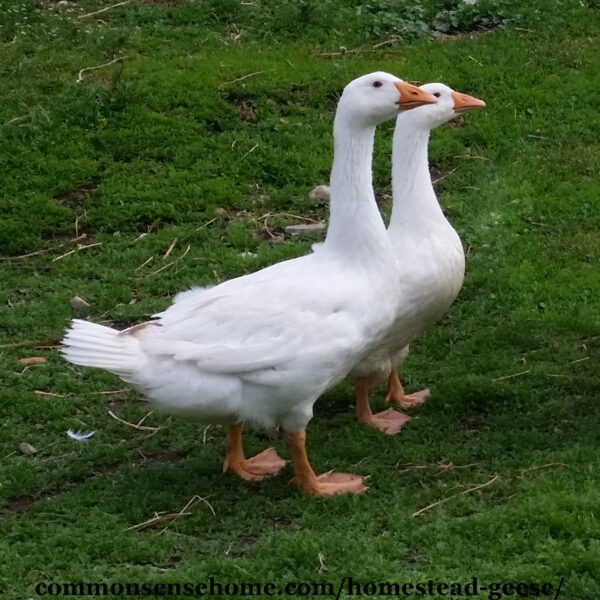
Goose fat is prized among top chefs, and many a hawk or fox has been scared away from a chicken dinner by the threatening wing span of an angry goose. You might share that opinion if you encountered an aggressive goose in childhood (or adulthood for that matter).
However, geese raised by you, from goslings (a young goose), can be as friendly as the family dog and twice as formidable when strangers or predators happen on to your homestead! There's nothing quite like a group of 10+ lb birds rushing at you with wings spread, loudly honking their irritation at your presence. I know our UPS driver respects them, as do the hawks that fly overhead checking out our free range laying hens.
Which Goose Breed Should I Get for My Homestead?
When I first decided to get geese, I wasn't sure which breed I wanted so I ordered the random mix “Weeder” package from a hatchery. We ended up with Africans, White Chinese and a single Embden (also spelled Emden). While I've enjoyed them all, our Embden is the sweetest and most interactive of our geese.
Toulouse and Pilgrims are also highly recommended for calm, gentler personalities. They might not be *quite* as effective as guardians due to their laid back nature, but they'll still give an alarm honk when something is going on!
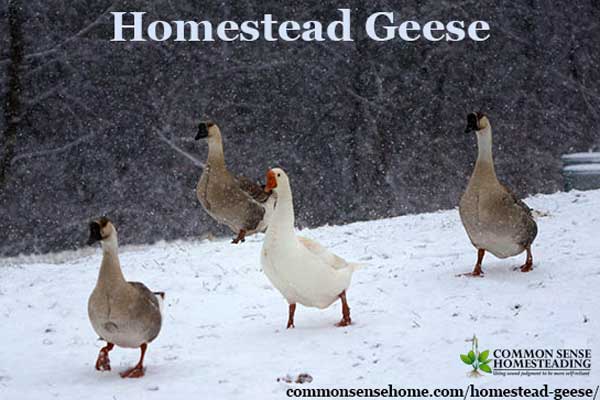
For a full list of domestic goose breeds, visit poultrykeeper.com “Domestic Goose Breeds”. The American Livestock Breeds Conservancy has a priority list of goose breeds that are considered Critical, Threatened, under Watch and under Study. On the Critical list are:
- American Buff
- Cotton Patch
- Pilgrim
- Pomeranian
- Roman
- Shetland
Sebastopols are considered Threatened. Africans, Chinese, Toulouse-Non-Industrial are on the Watch list.
When Should You Get Your Geese?
We ordered ours for delivery in the spring from Murray McMurray hatchery, but they are available from a variety of online hatcheries. If you have a particular breed in mind, place your order early as they sell out quickly!
Just like you would with young chicks, you'll want a sheltered brooding area, safe from predators, until they feather out.
Some options for food and water include:
- Feeder base for quart jars (for goslings)
- Waterer base for quart jars (for goslings)
- EZ Fill Poultry Drinker (for inside water)
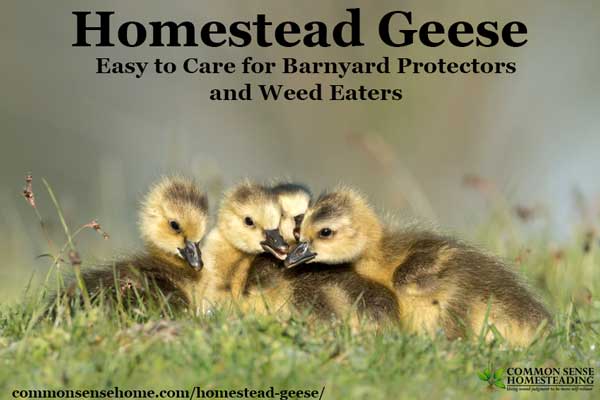
What Do Geese Need for Shelter & Food?
Our adult geese prefer to free range 24/7, and even with coyotes and foxes in the nearby woods, we haven't had any issues. They stay close to home and don't wander off. While I've tried providing shelter for them, they have rejected it at every turn…which is something I've seen from other goose keepers.
Editor's note: My mom raised large flocks of geese and ducks for years. I would highly recommend putting them inside for the night, whether they like it or not. Over time, or under stress, predators will get bolder. One night when I was a girl, I forgot to lock the shed door where the geese and ducks were kept. The neighbor's dogs came over and ravaged the breeding stock. It was horrible, and I will never be able to get those images out of my mind.
The big thing you need to keep your geese happy is a place to bath and play in water. We have a plastic kiddie pool that they adore, but in the winter it's difficult to keep it from freezing solid. So I keep a deep rubber tub filled for them to play in, and of course, there are always a few 5 gallon buckets to dunk their heads in. Water = happy geese.
As for food, they are big time grazers and spend most of their time walking around and nibbling on greens with a few bites of chicken food mixed in. During the winter, we've been feeding ours a free choice mix of field peas, black oil sunflower seeds, oats and cracked corn. When they were goslings, we had them on a chick starter crumble, and fed LOTS of green grass while they were confined to the brooder. They would devour that grass faster than you can imagine!!
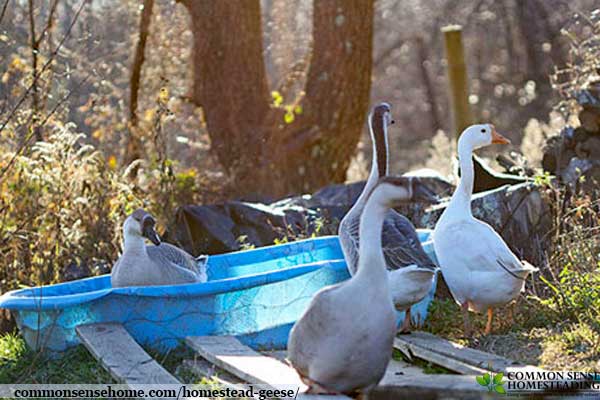
Can You Free Range Geese with Your Chickens?
Yep! Ours do, and the only big warning I'll provide is making sure your chickens have a safe area for water. The geese tend to be bucket hoarders and won't let the chickens in to drink. Bullies!
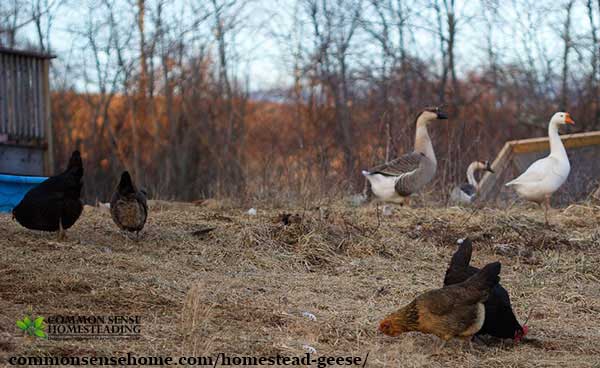
Aren't Geese Aggressive?
That is dependent on breed, gender and whether it's breeding season or they have a nest nearby. Two of the breeds we own are commonly known as the most aggressive, and with the exception of a minor goose pinch to the UPS driver that didn't obey their honk warnings, we haven't had any incidents. They tolerate the chickens (but protect them), and they'll chase our cats/dogs if they come too close to the geese. I prefer to say they have a pretty wide personal space bubble, rather than being “aggressive”!
But that said, I've worked really hard socializing them from a young age with the cats, dogs, kids, adults and so on. They love to follow me around when I'm doing chores and nibble on my clothing or jacket if I stay still long enough. It's both endearing and annoying, depending on what you're doing!
Editor's note: I had a pair of pet geese one summer as a teenager. They hatched out late and were raised separately until they grew large enough to join the main flock. They were named Tweedledee and Tweedledum, and they followed me everywhere!
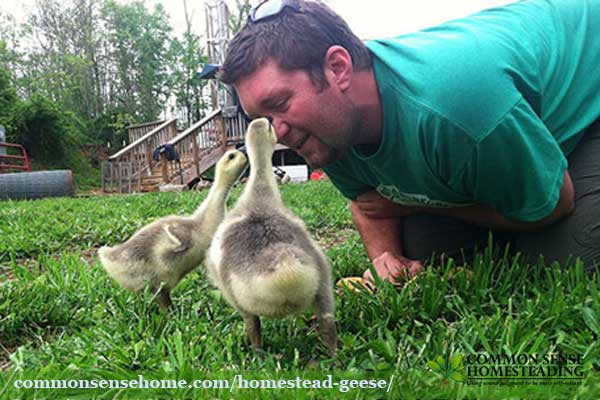
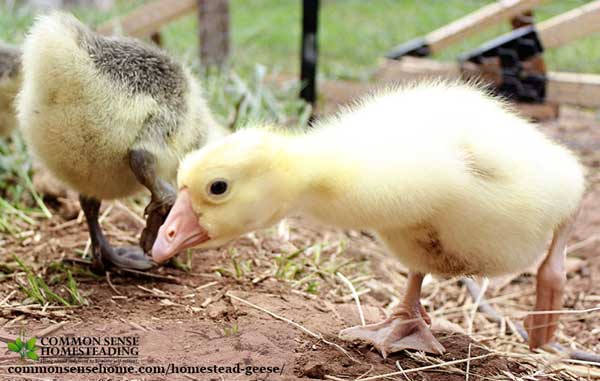
More Information About Homestead Geese
I've found The Small-Scale Poultry Flock by Harvey Ussery a great resource for geese and all backyard flock questions. Other good resources include:
- Domestic Geese
- Keeping Geese: Breeds and Management
- Choosing and Keeping Ducks and Geese: A Beginner's Guide
I will warn you that geese are QUITE loud, varying by breed, and messy. If those things bother you, it's possible geese aren't for you. But if all else fails, you've just raised up a Christmas goose for roasting, right?
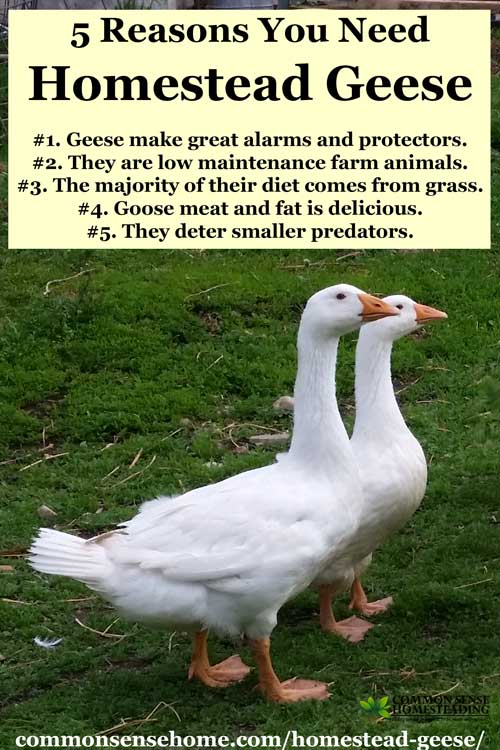
This is a guest post by Erin Kelly of Blue Yurt Farms. Erin and her husband, Mike, live on 22 rolling acres in rural Southwest Virginia. A rag tag mix of farm animals keeps them company, from oinking pigs to honking geese. They’re slowly using sustainable methods and animal power to rehabilitate their land…one acre at a time.
Don't miss the rest of the posts in our Homesteading series, including:
- Duck Pest Control – Working with Ducks in the Garden
- 7 Best Chicken Tips for First Time Chicken Owners
- Best Laying Hens – Fro Beginners, White Eggs, Brown Eggs
- Getting Started with Homestead Goats
- Rabbit Breeds, Basic Rabbit Care and Interesting Rabbit Facts
Originally published in 2014, updated in 2017.


Hi, I find your site fun & very informative! I live in Minnesota & I’m the proud owner of 2 baby geese. They are almost a month old & I have them currently in a pen with 10 baby chickens that are about 2 weeks older than the geese. I prefer to free range the chickens & geese but several years ago when I had just chickens they were slowly picked off by predictors. We have a lot of racoons around but the main problem were hawks & eagles. I don’t plan to free range the chickens this time but their pen is way too small for the geese once they’re fully grown & even before that now that I see how fast they’re growing! Although I’m in the pen with them daily while I clean it & feed them, they stick pretty close to their chicken buddies. I handle the geese daily & take them to a small fenced in area outside where I have a small pool for them but they still seem to be afraid of me. Do I need to handle them a lot more to ensure they don’t get aggressive? I need to eventually free range the geese during the day but not sure how to start doing that. If they’re not fenced in do geese typically stay around the farm or the area of their shelter? They are just starting to get their feathers & I have no idea what kind they are or their gender. Is there usually problems if they turn out to be both male or both female? I know, so many questions! But I appreciate any knowledge or information you would be willing to share. Thank you!
It sounds like the geese may have imprinted on the chickens rather than on you. The only times we had geese that were more affectionate and less skittish is when they were raised in the house for several weeks (oddball hatchings) and imprinted more strongly on humans.
If there’s a special treat they like, you may want to work with them like we did for our duck flock, with a whistle to signal that it’s treat time and they should come in. More on the duck training here – https://commonsensehome.com/duck-pest-control/
Back on the farm, the geese tended to stay around the yard. There was a small pond, and sometimes they would try and stay in the pond overnight and it was my job to go in after them and get them out.
We never tried training them back on the farm because the bulk of the flock was harvested for meat each year.
They should get along with just two, but anything is possible.
Our goose is sitting on eggs but were not sure what to do when they hatch because we dont want to take them away from her. So is it possible to let her keep them without giving them extra food other than grass??
It’s best to have her regular food and water somewhere nearby so she can leave the nest for short periods of time to get a bite to eat and drink as needed.
I have purchased a pair of geese to put with my pygmy goats. Living in west Texas grass is not something we have. What else can I use to replace grass for them?
Geese will eat a variety of plants other than grass. See if you can find another local with geese, and see what they grow for their flocks.
I’ve read that Emdens can be aggressive toward other geese breeds? Yet I see you mention you had a chinese and emden goose? Those are the two breeds I’m most interested in and wonder if they would both get along together?
We had Emden and Chinese together in the barnyard with no issues.
I am planning to plant some trees, evergreen plugs, and was wondering if i could use geese to keep the weeds and grass down in the new shelter belt?
I’m sure they would help some. They’re not as reliable as a mower, and heavy grazers like sheep would clear more thoroughly, but the geese won’t eat your evergreens. I’ve never seen any stats on recommended stocking level for weed control. I’m sure it varies dramatically depending on the forage, the geese and other factors.
I have read in books to use somewhere around 7 geese per acre for orchards.
I would imagine it depends on the geese and the orchard, but that seems like a reasonable place to start.
I have a story I want to tell and you all can make of it whatever you wish and maybe add a comment about it with your own theories. My dad had about a dozen geese that he loved when I was a young man on our farm (1960’s). The geese were always around the farm area and never left. The day came when my dad died and I noticed that the geese would not stay in the yard anymore. They would travel to the far end of the farm (640 acres) until they met a fence and would stay there until I went and got them back. I did this several times and quickly got tired of doing it. I mentioned to my wife how strange it was for them to do that because they had never done that before. Why it didn’t occur to me is anybody’s guess, but my wife pointed out to me that they left the week that my dad died. I never could keep them around anymore and eventually the predators got them all. Anything to it? I don’t know but I can’t think of any other reason that caused this change with the geese.
Geese are smart, and they form attachments. They can also live quite long. Mom used to raise them for meat, but I don’t think I could do it.
Glad I found this page, some real good stuff
My situation completely different moving onto 3 acres in Philippines, so no winter weather issues.
I plan on geese, dogs, goats, rabbits and pigs (2 of each) and a dozen hens.
Good idea to get dogs & geese at the same time so they grow and know each other?
The area is getting more gentrified – nearest neighbours are 3-4 hundred yards away – do geese honking sounds carry very far? have your neighbours complained?
Predators I need to be wary of are water monitors and pythons, I hope 1″ mesh on 4′ fencing will keep them at bay
Geese can honk quite loudly, so you may want to make peace with your neighbors and make sure they are okay with your planned animals, or at least that you don’t violate any local zoning laws.
Any dogs kept on the homestead with livestock of any sort must be well trained. It doesn’t matter specifically when either the dog or other animals are introduced, but you must work with your dog to establish that your animals are not to be chased for “play” or treated as food. Dogs can very quickly decimate a flock of chickens and seriously injure larger animals.
As for keeping out the snakes and water monitors, I’d check with neighbors who keep animals and see what they found to work best. Hopefully that will save you time, money and missing animals.
Area we have the property is former agricultural becoming residential – we don’t need np stinkin zoning laws here.
Most neighbours have goats, pigs and chickens and cows……chickens are left to run free mostly so doubt predators will be much of an issue, although my brother caught and killed a 10′ python on one of our other lots but that lot was waaay more remote and up in the hills…..I have seen a couple of 4-5′ water monitors about 3 miles away, nearer water.
When I was growing up in England we had a couple of dozen chickens in a pen in the backyard and a bulldog…Bill was introduced to them as a pup and would chase them, eventually one of them would turn and give him a peck on the nose = that meant end of the chase. Sadly he began to break into neighbours chicken runs and chase theirs…..they didn’t realise it was only play and chase them until they collapsed and died……that was the end for Bill in our village
I used to live near someone who kept peacocks and we could hear them a couple of hundred yards away….no-one complained,,,,noise was mitigated by the trains at the back of the house and their horns (there was a level crossing 1/2 mile away)
There’s a new international airport being built about a mile away…….:)
amazing what you get used to over time
Here in the States, there are a lot of restrictions as to what can and can’t be on a property. I figured it might not be a concern in your area, but didn’t want to assume.
In my experience, where you have livestock, there’s always something looking for a free meal – whether it’s wildlife or humans. Free range for some animals during the day may be fine, but at night, I like my crew locked up in a sturdy shed.
Sounds like the noise should be a non-issue, given the level of existing background noise.
On the dogs – I personally would never, never allow a dog to chase poultry – at all – even as a puppy. It sets a bad precedent. To them, it’s a fun game they really like to play. This is asking for trouble. Back on the farm, we firmly established that poultry were off limits. The dogs were trained to help herd the larger animals.
I previously posted about my raccoon problem and this is an update and reply to Leslie’s loss. At the time of my previous posting, I had gotten 30 raccoons. Believe it or not, I am now up to 95 as of a few days ago (six months of trapping them). Since it is now winter, I only catch them when a warm night happens. All of my raccoons have been trapped within a 1/4 mile radius from the geese. I have not lost a goose for a long time now but I am sure I will have to keep trapping almost year round. As far as there being signs of the attack on a goose, I sometimes saw it around, but most times not. I think they grab them and take them away most of the time. In the 60’s, we had a lot of pheasants around and now you can’t find any and those that try to introduce them, fail every time. I believe it’s because of the rampant raccoon problem. They hunt the fence lines and grassy areas where pheasants stay and get their eggs and their young. I don’t believe the Game & Fish Department puts enough emphasis on factoring in raccoons for the lack of pheasants.
Thanks for sharing your experience, Ed.
Ed,
We live in upstate New York and also have raccoons, but not nearly as many as you have. Our DEC is supposed to take them and rehome them, but they’re always “too busy.” If you trap them and then release them within a quarter mile of where you trapped them, they’ll return. If you release them further away, they’re unable to fend for themselves and they die. NY state law prevents us from killing them. It’s frustrating, to say the least.
What do you do with them, if you don’t mind me asking?
Sorry, Robynne, I didn’t notice your question until tonight. In South Dakota they are considered a predator so we can trap them any time they are a nuisance and destroy them. I am not sure why you say that taking them farther away than a quarter of a mile from you would cause them to die. Raccoons are very adaptable and would have no problem living anywhere you take them, unless you are talking about very young raccoons. Then they might have a problem without their mothers nursing them. Otherwise, I am sure they would be ok. Only problem would be giving someone else the headache.
HI..I am a first time goose owner…until last night I had 3, 1 male and 2 females..they are kept in a pen at night and allowed to free roam the yard and closest horse pasture. When I got home last night, the male was gone. The girls were sitting waiting for me in their usual spot, less than 10 feet away from my horse stalls.
My question is what would take a 20# plus male goose without any trace at all..there are no feathers, no evidence that he was ever there at all. I searched my entire property for any sign but found nothing. I have lost chickens to bald eagles, coyotes and 1 time a weasel..but there has always been a pile of feathers or a trail of feathers ..but nothing..he would never leave his girls to wander. What do you think happened to him???? I’m heart broken
What about trespassers? If wildlife or even neighbor’s dogs take a goose, there’s usually a trail.
I have enjoyed reading all these posts
I adopted an African Gander from a boy who raised him from a gosling till I got him when he was 10 months old . Hal is friendly and has only been aggressive a few times in the 9 month since he’s been with us. We also adopted a goose from a woman who has a large pond and yard of geese and ducks. The goose had never been aggressive but is shy. We call her Mama goose
And she hatched one egg in July
The geese are good parents but we have not been able to close to their gosling who is now as big as mama .. Not sure if Mak-Mak is male or female but Mak Mak is beating up Hal and is aggressive. I wonder if this is a male behavior and if so I think it not wise to keep two ganders and one goose even if they are father and son . Questions ; if I was to remove Mak Mak from his parents could he be socialized ?
If I were to adopt another goose or raise goslings ( females) would that help the situation .
If Mak-Mak is being aggressive, odds are he’s a gander. Now that he’s approaching adulthood without being handled early, it would be tough to socialize him.
In our flock, we normally only kept one gander, as they tend to be very possessive of their ladies. Geese don’t care who is related to who once they reach maturity. Even with more female geese, the dominant male usually does not like to share. If you had a much larger flock (10 or more birds) you might have more luck. (We’d usually overwinter a breeding flock of 6-8 birds.)
One time mom tried to introduce a young gander because our old gander was so old he’d become impotent (and we raised geese for sale, so we needed a productive breeding flock). The old gander wouldn’t let the young guy anywhere near the ladies. He also became more aggressive towards us, biting and beating with wings when we were working outside, often attacking from behind when we were working on something else. Mom finally had enough and butchered him, but the old gander had the last laugh. He was so tough that he was nearly impossible to chew.
Goose eggs make hands down the best noodles. It causes the mix to stick together very well. While my daughters were young we had a couple different experiences with geese. One, though treated like a baby; carried around everywhere, was a nightmare when grown and it ended up in the oven. The next one, a mix breed was raised the same way–try to convince 2 preschoolers of a different way to raise ANYTHING! She grew up the sweetest, best pet. She ended up being the one and only and didn’t bond with the chickens but hung out with them when we weren’t around. She was given to a young girl when daughter #1 got married. She was old but didn’t show any signs of it and was happy with her new person. (they spent time together before).
They ARE very loud and we felt she called in the coyotes and stray dogs. We finally got a couple Great Pyrs to stop the slaughters. (They are marvelous dogs but have an incredible capacity to bark-so live OUT, not in town).
Thank you for sharing your experience, Jeanne.
That is such a sweet recount, Jean.
I have 2 female African goslings, about 2 months old now. We have a very large house, on 44 acres in So. cal. , and I have a large , open room, with huge connected boxes for them. We go out twice a day, to hike and swim. What a joy to watch them dart around under water! Now their beautiful feathers are coming in, they have personalities, and I am cleaning the shavings four times a day. How to acclimate them to a pen, with grass, and Thor own pool? My huband is taking forever getting around to building their house. We have 6′ fences, but the owls, hawks, & coyotes are ever present. And how they cry, when left there for an hour!
I wanted to share my experience with a preditor problem in my geese. I bought goslings this spring for the first time. I raised them in our very large sheep shed and I couldnt wait to put them in a high fenced large shelter belt area that had a pool of water from a flowing well in it. I thought it was the perfect setup for my 28 geese. Lots of grass, protection from blizzards and extreme cold, water, and a high fence around it so they could never fly out. The first night I left them out I lost a few so I started putting them in the shed at night. I thought it might be our dog but wasn’t sure. Some time later circumstances happened where I left them out another night and I lost several. Anyway, I figured out that raccoons were killing them and I began to trap them. In my farmyard area, I have taken over 30 raccoons and now realize i will never be able to leave my geese out at night. My geese are 3/4 grown and the coons will still kill them and I’m not sure if they will stop when the geese are full grown. My plan is to set baited traps around the shelter belt fence nearly year round and to build a shed just for the geese to come in at night because they do mess up a shed with feathers and excrement.
We had similar conditions at my mom’s place in northwest Wisconsin. We could not leave any poultry out at night or something would carry it off or kill it.
Erica: I had the same thing happen to one of my geese two months ago. Since she was only a year old, I let her hobble around and allowed the fracture to heal on it’s own. Well, as she improved over the two months, suddenly, the leg got worse and started to swell. At that point she stopped walking on it as much and would not go out to pasture unless I picked her up and brought her out. Finally, brought her to an avian vet who diagnosed that the fracture healed beautifully, unfortunately, esteomyelitis had set into her leg bone. I decided I had to put her down as the prognosis was not good.
Now my other goose is lamenting and it’s heart breaking. I strongly recommend finding an avian vet near you to get her some antibiotics ASAP, so you don’t deal with a heart break as I did. The vet said that she should have come in MUCH earlier as they might have been able to ward off the infection. Call around to vets in the area. That’s what I did, until One vet knew a person in the area that did see birds. Best of luck to you. My thought is a fox might have grabbed her leg one night. I remember hearing commotion and I got up and yelled out the window…things settled and I went back to bed. It wasn’t long after that… I noticed she was lame. Good luck!!
Hello, I’m hoping someone has some advice for me. We have chickens, ducks and a pair of Super African Geese. They are quite noisy but also very aware of birds of prey flying overhead, or neighbours lingering close to the driveway. Recently my female has starting limping. Her foot and leg seem fine when inspected but at times she seems unable to support herself and hobbles around. It seemed to happen overnight so not sure if it has something do to with laying (10 eggs this month) or perhaps a sprain… I had been keeping her in a separate crate at night and carrying her down to our kiddie pond during the day to limit her movement which seemed to help but she still seems lame. Any suggestions what this could be?
I realize this is an older post but we have just gotten a couple of goslings – they’re a week old now – to raise with chicks to help protect the chicks from hawks. Can we separate the goslings, one with each group of chicks, or do they need a goose friend? TIA.
From Deb, my poultry lady (and this jives with what I remember back our family farm):
“I would not separate them. I also don’t think they will help much with hawks unless in a fairly confined yard. I have never seen them bond much with chickens. In a smaller space, it might help, though. Of course, you might try them each with their own group, and as long as the groups are not in range of sight, it might work. Otherwise, they push the fences trying to get at each other. We have chickens in with the geese sometimes. They don’t hurt each other, but the geese don’t give a crap about them either.”
Thanks for the reply. The person I know who raises them said that her geese sound the alarm when hawks fly over, which alerts the chickens to run for cover. Guess we will see if that happens here.
Hey Seadanes I would love to know as you go forward how it goes for you… I am doing my due diligence before we start our homestead and until now had never even known that geese could be considered “livestock” though the first animals we will be getting are goats and chickens and after reading this article it seems geese may possibly end up a part of that plan too… But I have a lot of research to do before deciding 100%
What I can tell you so far is that they grow really fast and they are not as cute at three weeks as they are at three days when they are fuzzy. They eat a lot of grass and they poop a lot. I’m not saying any of this to dissuade you – I’ve still got them, just figured since I didn’t know what to expect, I’d share so someone else would. 🙂 The person we got our goslings from said that she raises her baby geese right alongside her baby chicks. After two weeks, we began to notice that the geese were grabbing the wings of the baby chicks and pulling them, rather hard. At first we thought this was maybe ok, because the chicks didn’t seem bothered by it, but then we found one dead in the morning with fairly extensive damage to his little wings, and we pulled the goslings out of the brooder house. They are separated now and we will wait until the chickens have more growth before we put them back together to see if they work as far as an alarm for predators. If all does not go well, these are not pets and I have no problem with Thanksgiving goose. 🙂 I’ll continue to update so you know what our experience is.
Pigs remain my absolute favorite animal both for entertainment and for food!
“They eat a lot of grass and they poop a lot.” – yes, this is geese. 🙂 We always raised the chickens and geese separately at mom’s (ducks separate from chickens, too, but okay with geese). Usually we kept the different types of birds separate until they were at least half grown, at which point some of the flocks had the run of the yard together.
Ty Seadanes! It’s always good to have a heads up on others first hand experiences to get to know the range of what to expect… We are planning on 2 pigs at a time… One to feed and grow and fatten for 2 years and the first year one to harvest at the end of the year… Then each spring get a new piglet to raise for 2 years to grow and help in feeding the family ???? I personally have never had a goose roast so I was initially like okay… Can’t eat the eggs… Only the meat… So why keep them till I saw the built in alarm system lol… Can’t say I don’t like the thought of an alarm system for the cost of weeds and fodder and some treats!
Once they settle into a routine in the barnyard, they are quite protective of their space, and will let you know when something’s not right.
Nah! Roasted duck or goose is not large enough or that tasty, in fact they’re quite tough, unless of course you’re eating unhealthily and smothering your food in loads of oil and butter, and GOD knows what that’s doing to your poor liver! Here in South Africa, we opt for juicy large tender flesh of dogs from different breeds. Very, very tasty and you can always have seconds or thirds because there’s quite a lot of that meat, especially big dogs. So, give it a go and maybe, you never know, when your dogs get too aggressive or something of that absurd nature, you can shove them in the roaster too! Here, we just shove a large sharp skewer up the backside and put them on spits, for late barbies…:-)
Mom fed our family duck and goose for years and we quite enjoyed it. Maybe you simply haven’t had it prepared properly, or the animals you are were old and tough. There was certainly not a need for additional fat. In fact, as we cleaned the birds, we’d remove excess fat and render it for use in cooking. Delicious. Contrary to popular belief, there’s also absolutely nothing wrong with eating fat – including lard and butter – as long as it came from healthy animals.
Here in the States, dog in not commonly eaten. Further, meat eaters tend to have very lean and gamey tasting meat, so I doubt dog will ever grace my menu unless the apocalypse hits.
Nobody here, would ever consider eating man’s best friend. ???? It is horrific, heartless, and third world act. Thank God, horses are no longer slaughtered for consumption here. I know they are cruelly transported to Mexico for that purpose. God Bless U.S.A.
Great article! I’ll mention it to my customers if they’re new to geese. I raise Chinese and African geese and get a lot of similar questions.
I live in wisconsin. Theres more eagles and hawks here than you can count. Never had any problems with that, in 4 years of doing this.
I have 11 geese. I only put my African geese in barn at night during summer. And thats just to keep them quiet.
My Embden goose has the calmest personality by far.
Mom used to raise very large flocks of birds for many years in a very rural area of northwest Wisconsin. I’m glad your flock has been safe, I just remember all too well what happened with our flock when they weren’t protected at night.
Hello. Great Information. Thanks.
I was wondering if I could get your opinion on my situation.
I have a rural home on 9 acres, half lawn half forest. It is not fenced. No nieghbours. I live in where temperatures in winter can hit about -20F to 25F. Average about 14F.
Would geese be ok if I provided shelter? Would I have to build an enclosure or would they stick around the property?
My mom raised large flocks every fall and maintained a small breeding flock that she overwintered. She was in zone 3 in northwest Wisconsin, which had similar lows (sometimes even colder). The geese sheltered in an unheated outbuilding at night and free ranged during the day. The geese were good about staying on the homestead and returning to their shed at night. We had a small pond in the barn yard they would visit, but most of the time it wasn’t difficult to get them to come in.
The only time we had trouble was when a pack of neighbors’ dogs that were running wild attacked the flock, and when several eagles moved into the area. The wild dogs were taken care of permanently, but you can’t harm eagles and they devastated the flock. The attacks were horrific. The eagles hit them when they tried to visit the pond, and raked their talons along the bird’s back. We found a few birds badly injured, hiding in the tall grass and brush. Most we didn’t find anything but feathers.
I love my geese! I am so glad you wrote this article! I am looking at having to move back into town at some point, and I will be so sad to leave my geese. They definitely help with predator control–the only chickens that have gotten eaten are those that wandered into the pig pen and didn’t get out fast enough. I live now in the foothills of Colorado where coyotes and raccoons and foxes are numerous–not to mention hawks. No problems so far! They are loud but well worth it! Make sure you socialize them, or they will consider you an outsider and threat to their “flock” of chickens and ducks!
thanks. will see if we can work with her at least she has the other duck who we have had for a really long time.
Wanted to give you a update. we have lost Lucy , living in the country has many heartbreaking losses. PIA (aka the monster) is hanging with the little ducks for now, but seems very out of sorts. I . How do you think PIA will do without another goose to hang with .
When we were down to one goose, she just wandered around with the ducks, but that was an old matriarch momma. Only one sure way to find out, for better or worse.
I have a question. I have two geese one is a saddle back just over a year old and then we got another goose may that was under a year it is a white goose do not know the breed. We live on a ranch, they have a large pond, lots of grass. Ever since we got the second goose who is now larger then our Saddle Back (Lucy) they have become aggressive more towards are dogs, they are scared to death of them and the geese are taking advantage of that. I push them back to the pond when ever I catch them around the house or barn but I work and can not always be there. They came into the garage this weekend and cornered two of the dogs one is very old. They also now stand on the road and scream at the cars since people drive over a dam to get to the house we have to go and put them back in the pond.
Any advice would be greatly appreciated, I have had ducks in my pond for years and Lucy and PIA have several established ducks they will hang out with but only when they are not out bullying.
My first thought is “into the roaster”, as badly behaving geese are notoriously hard to retrain. You might try scolding the geese when you catch them behaving badly – harsh voice and threatening body language – so they make the connection between bad behavior and getting busted for bad behavior. Caging is an option, but you probably would prefer not to do that. I’ll be sharing this question on facebook later today to get more ideas from the FB community.
It is only the one showing the aggressive behave Lucy just seems to tag along with PIA who is the younger more bully. I will try more harsh words and body language and see if they get it. My husband seems to be able to have more of impact on them then me. Thank you for sharing see if anyone else has some suggestions.
Geese aren’t stupid, but they can be stubborn. If they respond more to your husband than to you, then voice pitch and body language might have a chance.
Lucy and Pia will be a work in progress . I have great hope we can work through this . And appreciate your help.
Good luck!
Thank you for this! We have just moved to a new town with the plan/dream of buying land to homestead and the basic animals are on my “to get” list. Can geese tolerate cold day time temperatures during the winter? Our winters are cold but not drastic like anything in the mid-west, northwest etc. How many should you start with?
Geese can tolerate cold as long as they have somewhere to shelter from bitter cold. You could start with just two, or the minimum you can order from a breeder or purchase locally. I wouldn’t go for large numbers unless/until you are sure they are the right animals for you. They are larger birds, and as such eat more and poop more and can make more noise, so they are not for everyone, but they are beautiful and tasty, too.
Aren’t geese kinda noisy? We live in town. Are they a good source of eggs? What about Geese vs Ducks?
You’ll note in the last paragraph, Erin says, “I will warn you that geese are QUITE loud, varying by breed, and messy.” I agree. Ducks also tend to be fairly loud, although I think Indian Runner ducks, which walk almost upright, may be a bit quieter, but they like to roam and forage. Ducks and geese also tend to be fairly messy, especially their watering area. In a small area, I’d vote for ducks over geese. Geese are quite large animals. For an urban back yard, chickens are probably easiest, but ducks would be much more manageable than geese.
Goose eggs can be eaten, but the larger the animal, the tougher the eggs will be. Geese will not normally lay nearly as many eggs as ducks or chickens will. I regularly cook with duck and chicken eggs, but have not cooked with goose eggs. Mom never used them for cooking, either.
Awwww! They’re ADORABLE!! I want geese!! I guess I always assumed they’d migrate, even when domesticated, lol. I imagined them coming back every year. If they can tolerate the snow, we might need to seriously consider raising some. They’d make a valuable addition to our homestead. Thanks for sharing!!
Your domestic geese are perfectly happy being domesticated. 🙂 Most of the breeds tends to be much heavier than their wild cousins, so flying is no longer an option.
We have four Toulouse geese, and they’re right at about one year old now. I think they’re great. Neighbors might not always agree with that, but I can assure you that nothing goes on within their field of view that they don’t know about – and let us know about.
I’ll second the motion about locking them in at night. I’ve done that right from day-one, but the gentleman that we got ours from has lost more than a couple to the local coyote and fox. That’s a chance I’m not willing to take. I lock mine in just before dark and let them out in the morning. They have no food or water when they are locked up. I’m sure they would rather have some, but they turned their night cage into a sloppy, stinky mess, I removed the water and they’ve done just fine.
One thing I’ve noticed is that their personality changes over time. As they get older, they get noisier and more aggressive. It took one nip from my gander and the resulting “discussion” from me to convince him that he needed to cool it around me. So far, that lesson has sunk in pretty well – unlike roosters that have to “relearn” that lesson about once a day.
As fun as it is to have goslings follow you around because they have imprinted you at birth, I don’t think that’s a good idea in the long run. You don’t want them thinking of you as another goose. If they do, then you become just another part of the flock when it comes to establishing who’s the boss. You want to clearly be another species that is not in competition for a mate and for dominance.
Great article and great site – thanks!
Stephen Clay McGehee
The Southern Agrarian
We never had any issues with dominance/attachment as the hand reared goslings got older. They joined the flock, were treated like the rest of the geese, and settled right in. At most they’d be a little more chatty at feeding time.
Hi Erin. I read this with great interest because I have never considered geese as livestock to raise. It is definitely something that I will be thinking of in the near future, as we are looking to move off of family land by next summer. I noticed that you live in SW VA. I live a couple hundred miles east in South Central/SE VA. I was wondering how they do in the winter, especially like this week, since we have just had several inches of snow and our low tonight is supposed to be in the single digits. I also have two large dogs that are pretty territorial and while I’m sure that geese can hold their own, I would not like them to be stressed every day by my dogs being bratty (which they are to the several cats in our area and used to be to the horses that were pastured here). What are your thoughts?
Hey Stephanie! Well, as with any new animal to the farm, you’ll need to socialize them with your dogs starting from a young age. That will help both your dogs AND your geese have a more balanced relationship once the geese are adults. 🙂 Geese are definitely territorial as well, so they don’t allow sass from dogs like cats/horses will. At the same time, I’ll say our herding dog loves to herd our geese and it creates quite the ruckus outside. So if your dogs are constantly pestering the geese, it’s not going to be a very peaceful arrangement for anyone.
I’d encourage you to try it though, and if it doesn’t work…there is always a yummy goose dinner OR sell them locally. I’ve noticed more and more people are interested in geese these days, so I’m sure you could find a home for them.
On the winter issue, our geese are happy in snow and even deal with the ice we’ve been plagued with this winter. I’ve provided them some thick straw to cuddle in, but often they choose to nest out in the snow and just tuck their feet up into their wings and that’s that. I’d say they do winter better than any other animal we have, and we’ve had plenty of nights in the negatives and quite a few single digit days! Brr!
Summer is easy to deal with by providing plenty of water for them to play in and make sure they have a shady area to settle.
Good luck!! 🙂
Thank you Erin and Laurie! My dogs are sort-of “trained”. I am the alpha in our pack inside the house, but they are country dogs and have a pretty wide range around our land (maybe half a mile or so on all sides). I think that if they got some talk-back (and chasing) from the geese, they would probably turn tail and run, But I can’t be sure. They are both very friendly and would probably lick a bad guy to death, though my honey tells me that they would attack if they saw me threatened. But they sure love to chase anything that runs. They don’t even try to catch it; they just want to chase it around and bark at it (rabbits, possums, deer, raccoons, the aforementioned horses, even a skunk once-that was God-awful!). And other dogs, well, it depends on whether it’s a boy or girl. My female will play with the boys, but my male wants them gone (thankfully, we have never had any fights). Anyway, thanks again for both of your replies. This is definitely something I will keep on my mind and discuss with my honey. Take care to you both.
I second Erin’s point on geese in winter. My mom kept her flock up in northeast Wisconsin, and they were quite cold hearty. We always had farm dogs, too. As long as the dogs were well trained, there we no issues, but boundaries did need to be established early on.